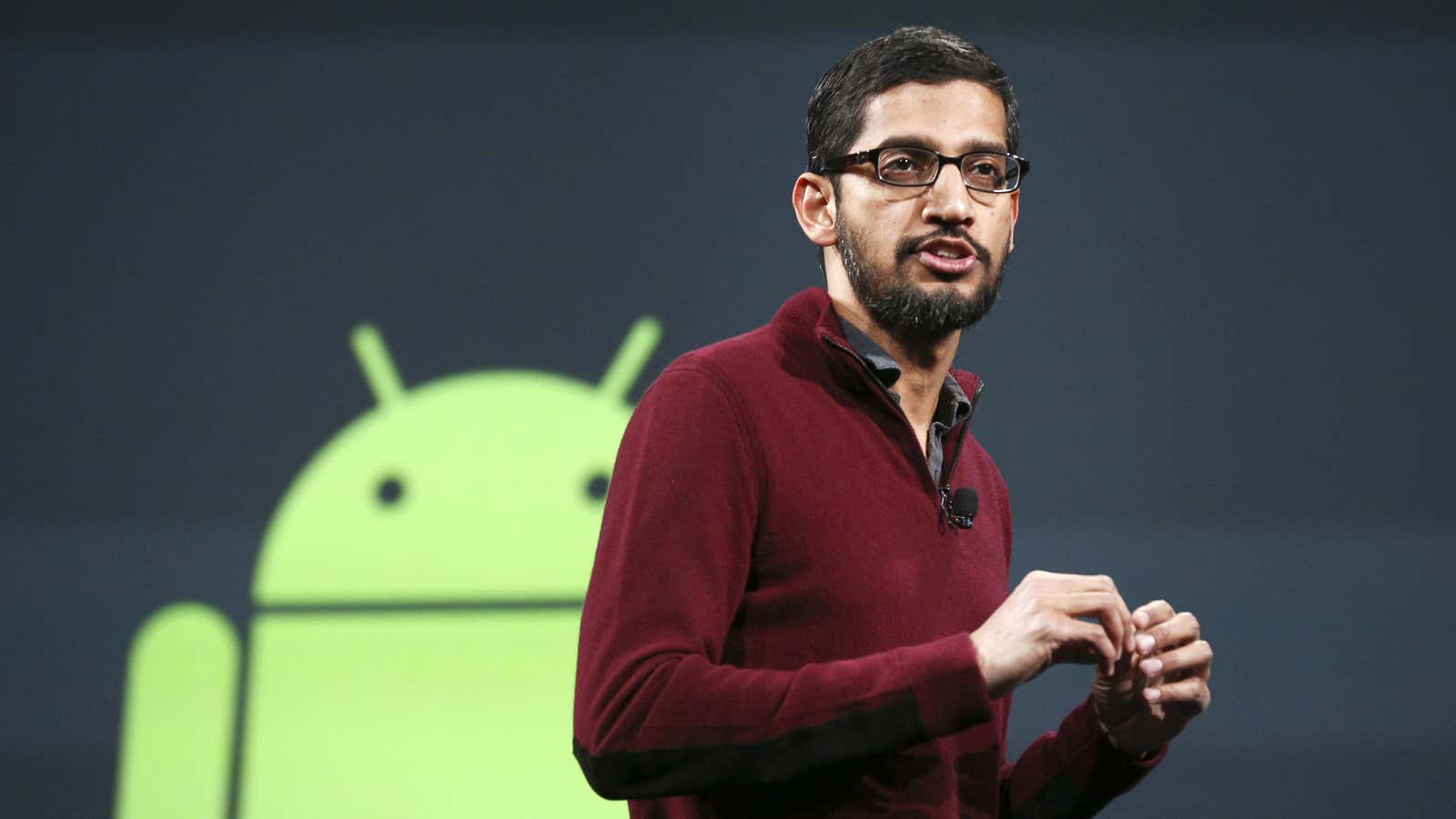Google has joined the world’s biggest mobile operators to boost adoption of a replacement for SMS. The company, which owns Android, the world’s most popular smartphone operating system, will make its messaging technology available to an effort to standardize the use of Rich Communications Services (RCS).
The new standard is a significant upgrade over SMS. It offers many of the features users have come to expect from chat apps such as WhatsApp, WeChat, or Facebook Messenger, including the ability to send larger photos and videos, create group chats, and to see when another user is typing.
The move, announced today (Feb. 22), means Google is fighting in the same corner as the operators, who see the technology as a chance for operators to catch up to those “over-the-top” (OTT) internet messaging services. Operators have seen SMS revenues and usage decline as Messenger and WhatsApp have seen explosive growth.
The new standard, with Google’s backing, could offer operators a way back into the messaging space, with the potential to charge for it. Operators can look forward to monetizing RCS messaging through subscriptions or charging per message or photo sent. That said, Google hasn’t announced a date for the final implementation of the standardized software yet. Google expects the client to launch later this year, it told Quartz.
RCS lets users share photos and videos, see when others are typing, and set up group chats–in other words, much of what the OTT apps already offer. But RCS also offers operators control over how messages are delivered. If a user sends a message to another RCS user, then it is delivered over the internet. But if the other user isn’t on RCS, then it’ll be sent as a regular text message. Unlike a chat app, and similar to Apple’s iMessage, users don’t have to worry about sending messages to people who also have the app downloaded.
The GSMA has been promoting RCS since 2008. Today, it says 47 operators in 34 countries are using RCS technology. Many operators already offer a version of RCS messaging under various brand names. Vodafone has Message+ and T-Mobile has Advanced Messaging, for example. But it’s been too little too late, as OTT apps have surged in popularity. WhatsApp, a company launched just six years ago, already has a billion monthly active users. Platforms from Tencent and Facebook’s Messenger are not far behind.
As a result, operators are seeing shrinking revenues from messaging. The tipping point was 2013, when global revenue from SMS fell for the first time, according to a study by the British communication regulator Ofcom (pdf, p. 225) of the 17 countries it tracks. Here’s what that looks like:
Google’s arrival on the scene will give the GSMA and the operators hope. The plan is for the operators to agree on a set of specifications at the back end that works with an Android client provided by Google at the front end. Google acquired an RCS startup called Jibe Mobile in September, in its first signal that it was getting serious about the technology. It’ll also use Jibe’s technology to provide infrastructure support for RCS, letting operators plug into its servers.
With Google contributing the tech, it means RCS features can now be deployed by operators with the assurance that they’ll work well on smartphones running Android. Google told TechCrunch that all Android devices would support RCS once its work on the project is done. This paves the way for operators to offer RCS services that are “baked in”—integrated directly onto the phone, instead of being routed through a separate app, which is how most operators, such as Vodafone, have been making the tech available. “Features such as group chat, high-res photo sharing, read receipts, and more, will now become part of the operator messaging experience,” the GSMA announcement said.
That’s a big boost for the SMS replacement, since Android has about 80% of the world smartphone market, according to IDC. It’s unlikely that Apple will use the RCS standard, since it competes with its iMessage platform—but iPhones account for just 13% of the global market, according to IDC.
At this point, Google is an also-ran in the messaging platform battles. Facebook dominates with its nearly two 2 billion monthly active users across Messenger and WhatsApp while Tencent claims 1.5 billion users on WeChat and QQ Messenger. But if it succeeds in making RCS the default messaging technology for operators around the world–and on its Android smartphones–then it might have found a way to break the stranglehold on user attention by its over-the-top rivals.
